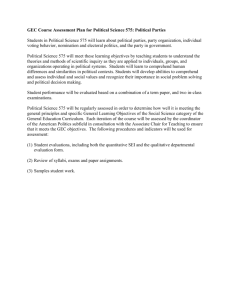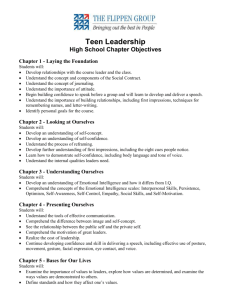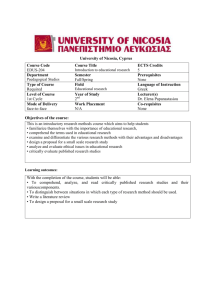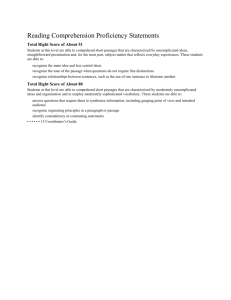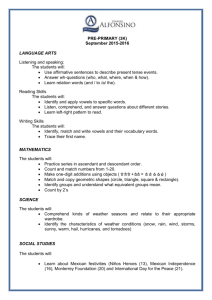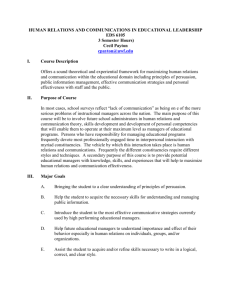FIN 1010 Introduction to Finance 3 credits
advertisement
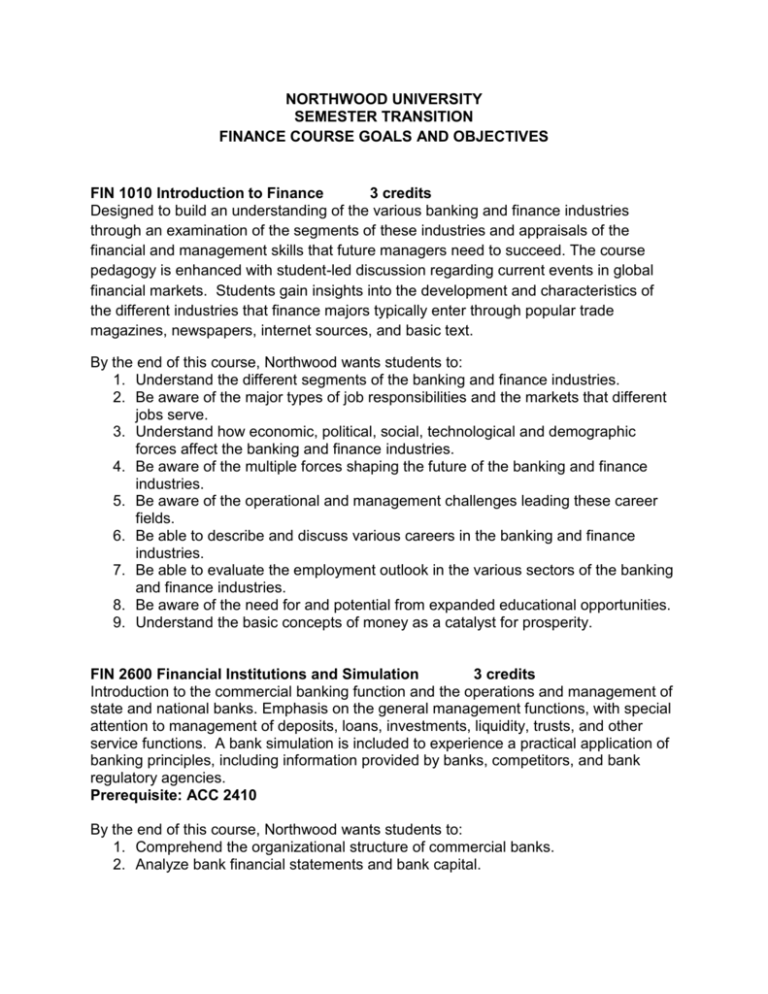
NORTHWOOD UNIVERSITY SEMESTER TRANSITION FINANCE COURSE GOALS AND OBJECTIVES FIN 1010 Introduction to Finance 3 credits Designed to build an understanding of the various banking and finance industries through an examination of the segments of these industries and appraisals of the financial and management skills that future managers need to succeed. The course pedagogy is enhanced with student-led discussion regarding current events in global financial markets. Students gain insights into the development and characteristics of the different industries that finance majors typically enter through popular trade magazines, newspapers, internet sources, and basic text. By the end of this course, Northwood wants students to: 1. Understand the different segments of the banking and finance industries. 2. Be aware of the major types of job responsibilities and the markets that different jobs serve. 3. Understand how economic, political, social, technological and demographic forces affect the banking and finance industries. 4. Be aware of the multiple forces shaping the future of the banking and finance industries. 5. Be aware of the operational and management challenges leading these career fields. 6. Be able to describe and discuss various careers in the banking and finance industries. 7. Be able to evaluate the employment outlook in the various sectors of the banking and finance industries. 8. Be aware of the need for and potential from expanded educational opportunities. 9. Understand the basic concepts of money as a catalyst for prosperity. FIN 2600 Financial Institutions and Simulation 3 credits Introduction to the commercial banking function and the operations and management of state and national banks. Emphasis on the general management functions, with special attention to management of deposits, loans, investments, liquidity, trusts, and other service functions. A bank simulation is included to experience a practical application of banking principles, including information provided by banks, competitors, and bank regulatory agencies. Prerequisite: ACC 2410 By the end of this course, Northwood wants students to: 1. Comprehend the organizational structure of commercial banks. 2. Analyze bank financial statements and bank capital. 3. Comprehend and synthesize various types of loans and how they are used by different segments of the economy. 4. Comprehend the various legal aspects of banking as they apply to the financial institution. 5. Comprehend and synthesize the relationship of commercial banking to other financial institutions. 6. Analyze the implications of international lending. 7. Analyze and apply liquidity management techniques, including deposit alternatives and bank investments. 8. Comprehend the financial institution’s role in merger and acquisition concepts. 9. Analyze, research and evaluate current banking issues. 10. Synthesize decision making in a banking environment. 11. Comprehend the regulatory issues associated with banking. 12. Analyze various banking functions (loans, deposits, etc.) 13. Synthesize the perspectives of the various departments of a bank. 14. Evaluate issues associated with bank expansion. 15. Analyze and apply pricing methods to various financial products. 16. Synthesize and apply various management issues as they apply to a financial institution. FIN 3010 Financial Management 3 credits Study of the theoretical and conceptual framework that the financial manager uses to reach decisions. Particular emphasis is given to the finance function and its relevance to the management of an enterprise. Analysis, problem-solving techniques, and decisionmaking tools are emphasized. Differences between multinational and domestic financial management, such as currencies, political and economic risks are discussed. Stocks, bonds, and interest rates are evaluated as they relate to the basic financial analysis of investments. Prerequisite: ACC 2415 By the end of this course, Northwood wants students to: 1. Comprehend the importance of cash flow to all areas of the firm. 2. Analyze how to use financial ratios to enhance management of the firm. 3. Synthesize basic business forecasting methods of financial statements. 4. Analyze the basic effects of leverage in capital structure. 5. Examine the concepts of working capital management. 6. Analyze the time value of money and its implications. 7. Appraise the rate of return/cost of capital that investors require and its relationship to risk. 8. Compare and contrast the relationship between risk and return, and the impact it has on management decisions. 9. Analyze the basic valuation process and income potential of stocks and bonds. FIN 3210 Financial Management 3 credits Required for students seeking a degree with a major or concentration in finance or accounting OR is recommended for those students pursuing a minor in accounting or finance. Study of the theoretical and conceptual framework financial managers use to reach decisions. Particular emphasis is given to the finance function and its relevance to the management of an enterprise. Analysis, problem solving techniques, and decisionmaking tools are emphasized. Differences between multinational and domestic financial management, such as different currencies, political, and economic risks are discussed. Prerequisite: ACC 2415 By the end of this course, Northwood wants students to: 1. Exhibit knowledge of the flow of funds through the financial intermediaries to the capital markets. 2. Exhibit knowledge of the objectives of financial management and the importance of the financial manager to the organization. 3. Comprehend the evaluation of the financial performance of the firm. 4. Comprehend financial forecasting methods and their necessity to the strategic growth of the firm. 5. Comprehend a variety of methods of financing and controlling the current assets of the firm. 6. Apply the time value of money. 7. Analyze how financial assets are valued and how investors establish the rates of return they require. 8. Apply and evaluate the methods and procedures of determining the firm's cost of capital. 9. Apply the various methods for ranking capital investment proposals. 10. Synthesize and apply the impact of risk on the decision-making process. 11. Evaluate the financial effects of all forms of leverage on the firm. 12. Synthesize and evaluate the virtues and drawbacks of debt versus equity financing. 13. Comprehend and analyze different financial management challenges when dealing within an international market. FIN 3600 Real Estate Finance & Analysis 3 Credits A comprehensive overview of the various types of real estate markets in the United States and how purchases and sales are financed. Students examine both standard and creative financing/structuring techniques used with residential real estate and income real estate properties. Purchase, sale, lease, and underwriting issues as well as real estate investment analysis techniques will be fully explored. The effects of market and economic conditions on the real estate markets are analyzed. Prerequisite: FIN 3010 or 3210 By the end of this course, Northwood wants students to: 1. Comprehend the legal considerations in residential and commercial real estate finance. 2. Comprehend and analyze the financing of residential real estate as it applies to all mortgages (basic fixed rate financing through “creative financing”). 3. Apply financing principles to the underwriting and financing of residential real estate. 4. Analyze the full effects of residential real estate financing decisions on the buyer, seller, and lender. 5. Comprehend the characteristics of commercial property markets. 6. Apply, synthesize, and evaluate comprehensive valuations of income properties. 7. Apply and synthesize financing techniques to residential and corporate real estate construction projects. 8. Apply financing concepts to land development projects. 9. Comprehend the secondary mortgage market in depth. 10. Comprehend real estate investment trusts and their purpose. 11. Analyze and evaluate real estate investment performance. 12. Comprehend the role of real estate in investment portfolios FIN 3750 Capital Markets & Analysis 3 credits An introduction to the basics of investing with emphasis on equities, debt, preferred stocks, convertible securities, rights and warrants, options, mutual funds, and fixed and variable annuities. The market on which each is traded, as well as fundamental and technical analysis, will be researched. Prerequisite or co-requisite: FIN 3010 or 3210 By the end of this course, Northwood wants students to: 1. Comprehend the capital markets with special emphasis on why, how, when, and where to invest. 2. Apply tools used to measure performance in the capital markets. 3. Comprehend the stock markets, the bond markets, the options markets, and the commodities markets. 4. Comprehend and analyze equity, especially as it relates to dividends, capital gains, and the valuation of such. 5. Comprehend and analyze the pricing of corporate, government, and agency bonds, and preferred stocks. 6. Comprehend and synthesize financial statement analysis as it relates to investing. 7. Evaluate convertible securities, rights, and warrants with special emphasis on conversion prices and ratios, the advantages and disadvantages of such. 8. Analyze and evaluate put and call options, as well as stock index futures options. 9. Exhibit knowledge of and comprehend mergers and acquisitions, new stock issues, stock repurchase strategies, as well as P/E ratio analysis. 10. Comprehend the impacts on the financial markets of commodities, currencies, interest rates. FIN 3760 Applied Financial Analysis & Portfolio Management 3 credits Continuation of FIN 3750, with particular emphasis on the intricate nature of assets contained in sophisticated securities. Concentration will be on the management of portfolios with special emphasis paid to growth strategies, income strategies, retirement planning, tax advantaged investing, stock brokerage trends, and overall financial planning. Prerequisite: FIN 3750 By the end of this course, Northwood wants students to: 1. Exhibit knowledge of and characterize equity markets, debt markets, mergers and acquisitions, new stock issues, stock repurchase strategies, commodities, currencies, interest rates, and how each impacts the overall financial markets. 2. Comprehend international securities markets, with an appreciation of risk and return, diversification, and methods of participating in foreign markets. 3. Analyze and evaluate mutual funds, with special emphasis on types of funds, fund objectives, distribution and taxation, and performance averages. 4. Synthesize and evaluate investment strategies, with special emphasis on growth investing, income investing, and capital preservation. 5. Comprehend and apply different methods of portfolio optimization, asset allocation, and portfolio protection. 6. Synthesize and evaluate the importance of following investment policy and the preferred components of such a policy so as to abide by the ‘prudent person rule’. 7. Evaluate career options within the securities business, especially stock brokers and hybrids, financial planners, trust officers, and insurance brokers. FIN 3850 Special Topics 1 – 3 credits Various topics in finance. These may be one-time or occasional course offerings. Prerequisite: Dependent on specific course content FIN 4010 International Finance 3 credits A comprehensive overview of the international monetary system in terms of its institutional structure, participants and their motivations, markets and products, as well as currency exposure and techniques in risk management. Prerequisite: FIN 3010 or FIN 3210 and ECN 3000 By the end of this course, Northwood wants students to: 1. Explain the role and purpose of the institutions in international finance including the Bank of International Settlements, the Basel Accords, the Chicago Board of Trade, etc. 2. Calculate the profit or loss resulting from a variety of foreign exchange and derivative transactions including exchange rate arbitrage across markets, covered and uncovered interest arbitrage, FOREX contacts and options, swaps, etc. 3. Apply basic theories of exchange rate determination including Purchasing Power Parity, Interest Rate Parity, the International Fisher Effect, etc., to identify longer and shorter term trends in exchange rate movements. 4. Measure the foreign currency risk facing a firm and identify appropriate hedging techniques for that risk. FIN 4100 Chartered Financial Analyst (CFA) Topics 3 credits Emphasizes various finance topics contained in the course of study for the CFA designation. This designation is a rigorous 3-year graduate program of study desired by experienced financial professionals. It is considered to be the ultimate credential for the financial professional throughout the industry. Finance majors who aspire to become an analyst and/or the corporate fields should take this course. Prerequisites: FIN 3760 Co-requisite: FIN 4550 By the end of this course, Northwood wants students to: 1. Exhibit knowledge of advanced financial concepts and techniques. 2. Analyze, critique, and apply financial concepts and techniques. 3. Comprehend the CFA areas of future study regarding quantitative methods. 4. Comprehend the CFA areas of future study regarding economics. 5. Comprehend, analyze, and apply the CFA areas of future study regarding financial reporting and analysis. 6. Synthesize and apply the CFA areas of future study regarding corporate finance. 7. Comprehend and apply the CFA areas of future study regarding equity, fixed income, derivative, and alternative investments. 8. Comprehend and synthesize the CFA areas of future study regarding portfolio management and wealth planning. FIN 4150 Certified Financial Planner (CFP) Topics 3 credits Emphasizes various topics contained in the course of study for the CFP designation. The CFP designation is an industry program of study that is desired by those selling financial planning services, and is usually taken soon after beginning one’s career. The CFP is a necessary credential for the financial planner throughout the financial planning industry. Students who aspire to becoming a personal financial planner should take this course. Prerequisite: FIN 3010 or 3210 By the end of this course, Northwood wants students to: 1. Comprehend the regulatory and ethical considerations for financial planners. 2. Analyze the basics products of the Insurance Industry and apply them to financial planning. 3. Comprehend and synthesize risk management and related legal issues as they refer to an individual’s financial plan. 4. Analyze the variety of investment vehicles that may be included in a client’s portfolio. 5. Apply client assessment considerations, economic factors, valuation methods, asset allocation techniques, and portfolio evaluation. 6. Comprehend and apply tax-advantaged investments to appropriate financial plans. 7. Synthesize employee compensation planning as it applies to an individual’s overall financial plan. 8. Apply retirement savings need analysis, qualified retirement plan design, Social Security, Medicare, and other retirement vehicles. 9. Analyze and apply the process of developing an estate plan. FIN 4230 Personal Financial Planning 1 - 3 credits Designed for those senior students not majoring in finance who will be graduating and leaving the university to pursue their chosen careers, this course will introduce the basic financial planning tools that are needed to acquire a comfortable financial life in the future. Skill topics will include saving, non-retirement and retirement investing, mutual fund/stock investments, house purchasing/renting and changing the financial plan as the student’s career and family situations advance throughout life. Courses offered for more than one credit will delve further into the course topics based on the number of credit hours. Prerequisite: 90 credit hours completed By the end of this course, Northwood wants students to: 1. Understand the “pay yourself first” concept of saving. 2. See the payback from “forced” or “automatic” savings plans. 3. Understand the differences between retirement and non-retirement investment accounts. 4. Understand the need for both retirement and non-retirement investment accounts. 5. Understand the tax-deferred benefits associated with retirement account investments. 6. Value the impact of 401K retirement accounts to their overall financial health. 7. Understand the difference between investing in individual stocks and investing in mutual funds. 8. Understand the importance of investment diversification versus get-rich-quick ideas. 9. Systematically choose mutual funds for diversified investments using a disciplined approach. 10. Understand the basic requirements for purchasing a house and how to borrow to finance that purchase. 11. Determine whether they should rent or own their house, car, etc. 12. Understand that financial needs change as their career and family situations change. 13. Realize the potential to become wealthy in the future by following tried and true methods. FIN 4550 Corporate Investment Decisions 3 credits Emphasizes case/discussion methods to develop an in depth expansion on the basic concepts presented in FIN 301/321. This course extends the financial analysis of a business to valuing complex capital budgeting and corporate strategies. Issues such as building the financial component of a business plan and using financial management techniques to identify corporate problems/opportunities and fix/pursue them. Options for various capital structures and the financing thereof are pursued in depth. Prerequisite: FIN 3010 or 3210 By the end of this course, Northwood wants students to: 1. Exhibit knowledge of advanced financial management concepts and techniques to business issues and apply such. 2. Comprehend and synthesize a firm’s capital structure and evaluate alternative structures. 3. Apply pro-forma financial statements for a variety of business plans and projects. 4. Analyze the corporate impact of capital projects, mergers, acquisitions, and divestitures. 5. Apply financial management techniques to evaluate international business opportunities. 6. Apply financial management concepts and techniques to evaluate various business issues. 7. Comprehend a variety of corporate valuation techniques and be able to apply them. 8. Exhibit knowledge and apply spreadsheet programs for financial analysis and modeling. 9. Comprehend and analyze the pros and cons of various financing techniques in a corporate setting. 10. Comprehend and synthesize the concepts and techniques to make corporate buy/lease decisions. 11. Exhibit ability to successfully present the financial component of a business project to higher management. 12. Analyze the impact and opportunities related to financial distress. FIN 4850 Corporate Financing Decisions and Valuation 3 Credits A capstone finance course that builds on the financial concepts learned in previous courses and presents an integrated approach to corporate financing decisions and corporate valuation. This is a case discussion and application course covering various financing and valuation approaches and the application of these methodologies in the contemporary business environment. Prerequisite: FIN 4550 By the end of this course, Northwood wants students to: 1. Exhibit understanding and analysis of financial models. 2. Comprehend previously learned financial concepts as they apply to corporate decisions and company valuations. 3. Organize and characterize the strengths and weaknesses of various major financial concepts. 4. Apply and forecast future value alternatives to financial models. 5. Comprehend, analyze, and evaluate asset, earnings, and cash flow valuations. 6. Analyze and apply a detailed and realistic sensitivity analysis of cash flow valuation models including terminal value, changes in operating margins, and capital costs. 7. Perform financing decisions in the international business environment. 8. Comprehend some of the more exotic valuation environments including venture capital and private equity valuation and the financing thereof. 9. Synthesize financial concepts and evaluate a comprehensive valuation of a public company, and adequately defend such valuation.

